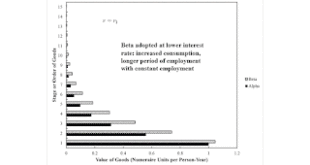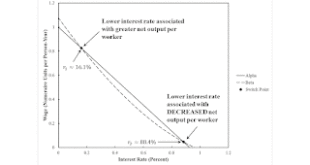Here is a list of books by Marxists that have stood the test of time. I am being impressionistic and probably idiosyncratic. I am more interested in analysis of what is than political organizing. What should be added? Removed? Frederick Engels, Anti-Dühring, 1877. I think German comrades learned Marxism during the second international more from this thick tome. I recommend other works for introductions these days. Vladimir Lenin, What is to be Done?, 1902. Lenin lays out a strategy and...
Read More »Profits Not Explained By Merit, Increased Risk, Increased Ability To Compete, Etc.
This post is for my commonplace book. I have been reading Enrico Bellino and Gabriel Brondino's "Circular vs. one-way production processes: two different views on production and income distribution" (Review of Political Economy, 2024). Bellino and Brondino draw a distinction between a circular model of production and a one-way model. In the latter, a finite, dated series of non-produced inputs (for example, labor) results in the production of the output. This dichotomoy is distinct from...
Read More »Another Hayekian Triangle Not Supporting The Austrian School
Figure 1: Hayekian Triangles for The Two Techniques1.0 Introduction This post is a variation on this one. 2.0 Technology and Net Output Suppose technology is as characterized by the coefficients of production in Table 1. All techniques are characterized by single production, no fixed capital, and no joint production. In the Alpha technique, the first corn-producing process is operated. The second corn-producing process is operated in the Beta technique. The ale-producing process is...
Read More »Paul Kengor’s The Devil and Karl Marx
Paul Kengor's The Devil and Karl Marx: Communism's Long March of Death, Deception, and Infiltration is a stupid and ignorant book. Kengor is particularly keen to chronicle atheist attacks from Marx and communists on religion. Juvenile Literary Works from Marx Kengor starts with a poem that Marx wrote when he was 19. Marx envisions himself, I guess, as a ferocious violin player, inspired by the devil. Apparently, Marx was a fan of Goethe. Kengor never uses the phrase 'sturm und drang'. He...
Read More »Adam Smith, David Ricardo, And The Labor Theory Of Value
1.0 Introduction I resolutely am not commenting on unhappy current events. Smith and Ricardo thought a (simple) LTV was not applicable to capitalism. Prices do not tend to or orbit around labor values. At least that is their claim. Ricardo had more to say about the LTV. This argument is not new. Smith confined the LTV to a supposed "early and rude state of society which precedes both the accumulation of stock and the appropriation on land" (WoN, book 1, chapter 6; see also book 1,...
Read More »Roger Garrison On The Inadequacy Of Hayekian Triangles
Hayek introduced his triangles in his lectures for his book Prices and Production. The first edition was in 1931 and the second in 1935. He attempted a more general treatment of capital theory in his 1941 book, The Pure Theory of Capital. I want to claim that Hayek knew that he could not draw his triangles under these more general assumptions. And that he knew that capital theory needed more development than he was able to give. Jack Birner knows this, although I do not know a reference...
Read More »Elsewhere
Samuel Bowles on how "Marx’s representation of the power relationship between capital and labour in the firm is an essential insight" Economics in the Rear-View Mirror on renewal of Paul Sweezy's instructorship. Manoucher Parvin, in 1992, asks, "Is teaching neoclassical economics as the science of economics moral?" Alexander Douglas on micro-founded macro. A review of Fredric Jameson's new book, in Jacobin earlier this month. A review of Fredric Jameson's new book, in the September...
Read More »The Production Of Commodities And The Structure Of Production: An Example
Figure 1: Wage Curves for the Two Techniques1.0 Introduction Economists following the Austrian school often represent the structure of production with Hayekian triangles (Hayek 1931, Rothbard 1962, Skousen 1990, Garrison 2001, Machaj 2017). Typically, goods of the highest order are produced with unaided labor or other unproduced original resources. (Fillieule (2007), in which a Hayekian triangle is constructed with an infinite stream of unproduced inputs, is an exception.) Rarely, is a...
Read More »Adam Smith On A Labor Theory Of Value
The following are the first three paragraphs of the introduction to the Wealth of Nations: "The annual labor of every nation is the fund which originally supplies it with all the necessaries and conveniencies of life which it annually consumes, and which consist always either in the immediate produce of that labour, or in what is purchased with that produce from other nations. According, therefore, as this produce, or what is purchased with it, bears a greater or smaller proportion to...
Read More »William Baumol On Marx
This is more for my commonplace book. The first two quotations are part of a symposium with Morishima and Samuelson: "This paper will suggest that the meaning of the relationship between values and prices described in Capital has been widely misunderstood. Commentators as eminent as Mrs. Robinson and Professor Samuelson have sought in the transformation discussion issues which Karl Marx never meant it to contain. Writers on 'the transformation problem' since L. Bortkiewicz have...
Read More » Heterodox
Heterodox


